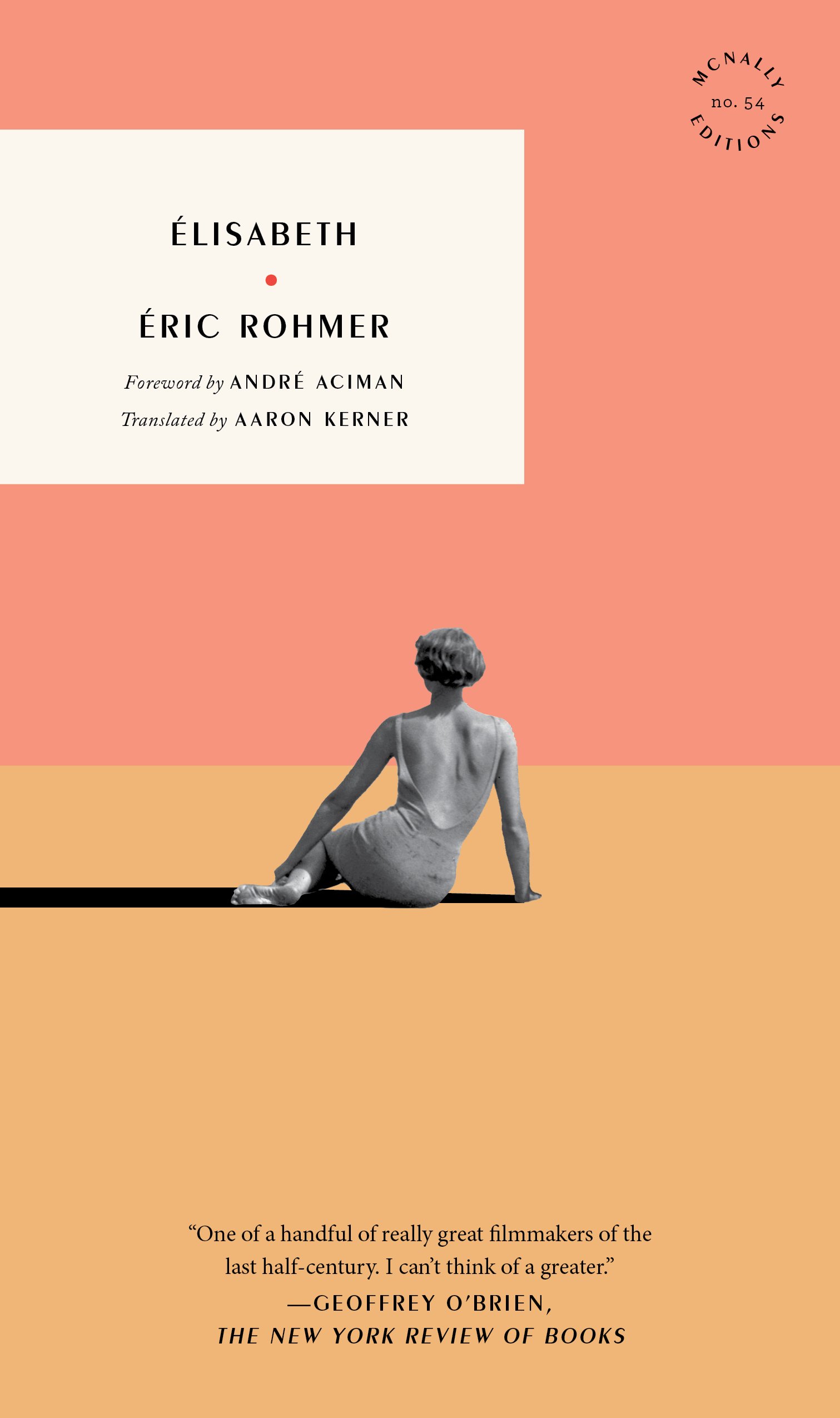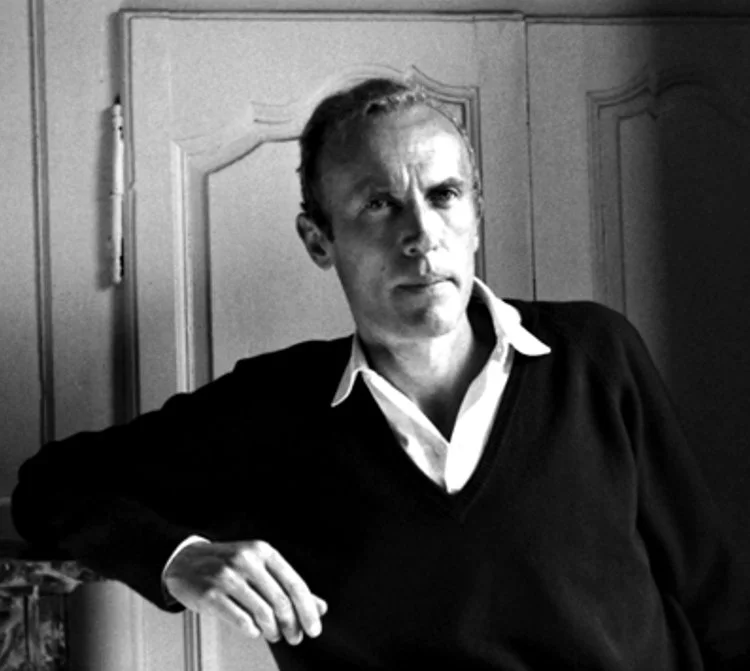Fifteen years before completing his first feature film—and ten before beginning a transformative editorial stint at Cahiers du cinéma that would usher the journal, and French cinema, into a new era—the man who would become known worldwide as Éric Rohmer published a single novel. Released by Éditions Gallimard alongside the early works of Claude Simon and Marguérite Duras, Élisabeth was part of the first flowering of what would come to be known as the nouveau roman—and was also the “matrix,” as Rohmer himself later put it, of the images, ideas, and formal concerns of his first sequence of films, Six Moral Tales.
Set in the sunstruck countryside east of Paris during the summer of 1939, a year ahead of the German invasion, where the upper-middle-class Roby family and its eponymous matriarch are spending a listless summer, Élisabeth is a war-novel awaiting a war. While the teenage Roby children and their friends swim, flirt, and lie to one another among the baking fields and icy meanders of the Marne, the novel becomes the scene of an anticipatory haunting. The simmering paranoia, calculated blankness, and potential violence of the coming Occupation are already present—as it were, in mufti. With a cool, kaleidoscopic eye, Rohmer lays out his protagonists and their precarious peace—their restlessness, their desperate boredom, their petty romantic agonies—with the unsettling chilliness and the sinister exactitude of details on a tactical map.
“My heroes, a little like Don Quixote, take themselves for characters in a novel, but perhaps there is no novel.”
—Éric Rohmer
“Rohmer was one of a handful of really great filmmakers of the last half-century. I can’t think of a greater.”
—Geoffrey O’Brien, The New York Review of Books
“Rohmer, as critic, editor, and friend, through his writings, activities, and personal influence, was the father of the French New Wave . . . In his youth, he had little interest in movies at all, but he was a gifted student and was good at philosophy, literature, drawing, music, and theatre . . . He had already started sketching Élisabeth at age nineteen . . . Rohmer’s surfaces aren’t placid but taut; they’re smooth because of their almost unbearably high tension, and their tautness is like that of a membrane that could, with a prick, be definitively burst, giving way to an unpredictably chaotic eruption of pent-up passion.”
—Richard Brody, The New Yorker
“Rohmer-world [is] an enchanted and yet peculiarly unsentimental place in which both words and actions, minds and bodies, matter absolutely . . . A Rohmer movie doesn’t clobber you with its smarts; it generously furnishes you a space in which to think for yourself . . . To find other artists besides Rohmer who can see this deeply into a character’s humanity and make us love him anyway—that is to say, who can ironize with this degree of gentleness—you have to reach up to a pretty high shelf: Shakespeare? Tolstoy?”
—Dana Stevens, Slate
“As in so many of Rohmer’s films, his characters are young and on holiday, free to enjoy the beach or the countryside . . . It’s a world where ‘everything just devolves into flirtation.’ That the Second World War is merely a month away is the furthest thing from their thoughts . . . Rohmer is still very young . . . but these highly discerning insights into conflicting emotions and human psychology will end up appearing in all of his films . . . Rohmer’s people can be embarrassingly intimate. Yet, despite their embarrassment, they retain a touch of eloquence in their speech that leaves them highly formal and at the same time highly vulnerable. In that sense, formality does not vitiate desire; it forces it to spell itself out. It’s also how intimacy turns into art.”
—André Aciman, from the Foreword
“Rohmer’s novel evokes suffocating human and natural atmospheres, shifting between interiors—a cramped apartment; a dentist’s office; the inside of a car–and sun-scorched backyards and village streets. It then releases the tension in a torrential summer storm, which is made immediate in finely etched details . . . Paradoxically, his novel is a marvel of cinematic showing, a closely observed engagement with nature and ordinary life.”
—Trevor Cribben Merrill, The University Bookman
“The elder statesman of the Nouvelle Vague, born a decade before Truffaut and Godard, Rohmer also served as the New Wave’s sage, resisting aesthetic and political fashion to maintain his chastely ironic vision of amorous folly . . . Rohmer’s films feel miraculously fresh, contemporary, lightly sprung.) His characters search for happiness, truth, self-knowledge, but mostly they seek love, and for all the cool classicism of Rohmer’s mise-en-scène, they frequently desire an all-consuming, engulfing love, or one that ‘burns.’”
—James Quandt, ArtForum
“Rohmer’s world is one of eternal youth, in which illness, death, and old age never seem able to interfere.”
—Jacques Kermabon, 24 images
“The novel would always remain Rohmer the filmmaker’s inspiration . . . Like Godard, like Hitchcock and Fritz Lang and, one might add, like Pirandello, he is obsessed with manipulation, with machination, with conspiracies, with artifice. . . . He fills the frame with a thousand details of existence . . .”
—Laurence Schifano, Rohmer en perspectives
“A Rohmer movie is not simply a drama or a comedy, a love story or an exercise in suspense, a psychological study or philosophical disquisition; it’s all these and considerably more. Whether an original piece or an adaptation, be it set in the present or the past, the city or the country, it’s always first and foremost a Rohmer film. In essence, he invented his own genre.”
—Geoff Andrew, The Criterion Collection
“Éric Rohmer is one of the few filmmakers whose name, no less than those of Hitchcock or Chaplin, has become an adjective. A Rohmerian film is one in which people talk, and talk at length . . . What they talk about, mostly, is love. Even when they’re talking about other things, as they often do—about art, philosophy, other relationships, personal preferences of various sorts—they’re still talking, by proxy, about matters of the heart . . . The smooth surfaces of Rohmer’s movies are taut, stretched nearly to the breaking point by the violence that they contain . . . The intellectual scope of Rohmer’s vision is philosophically and conceptually vast.”
—Richard Brody, The New Yorker
Éric Rohmer (1920–2010) was born Maurice Schérer in the province of Lorraine. After moving to Paris and befriending cinephiles and future directors Jean-Luc Godard, Jacques Rivette, Claude Chabrol, and François Truffaut, among others, he began writing, editing, and publishing film criticism under a pseudonym supposedly cobbled together from the names of director Erich von Stroheim and pulp author Sax Rohmer, respectively. Gradually following the lead of his fellow Cahiers du Cinéma contributors from theory to practice, Rohmer went on to direct more than twenty acclaimed feature films, including My Night at Maud’s, Claire’s Knee, and The Green Ray.
André Aciman is the New York Times bestselling author of Call Me By Your Name, Out of Egypt, Eight White Nights, False Papers, Alibis, Harvard Square, Enigma Variations, and Find Me. He's the editor of The Proust Project and teaches comparative literature at the Graduate Center of the City University of New York. He lives with his wife in Manhattan.
Aaron Kerner completed an MFA at Emerson College and lives in Cambridge, Massachusetts, where he works as an English teacher at the Commonwealth School. His other translations include Augusto Monterroso's The Rest is Silence.
Élisabeth • ISBN: 9781968671006
McNALLY EDITIONS no. 54 • Spring 2026 • Pub: Jul 7, 2026
$19 • Paperback with flaps • 5” x 8.5” • 224 pages
Fiction—20th century French / filmmakers / nouveau roman
Rights: World English, Audio
eBook ISBN: 9781968671013
UK Pub: Aug 20, 2026 • UK Price: £13.99








